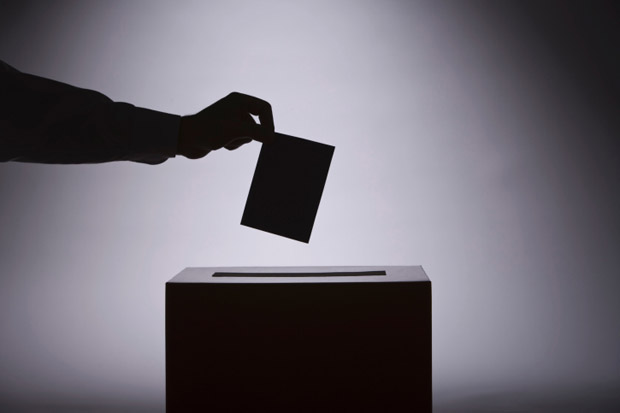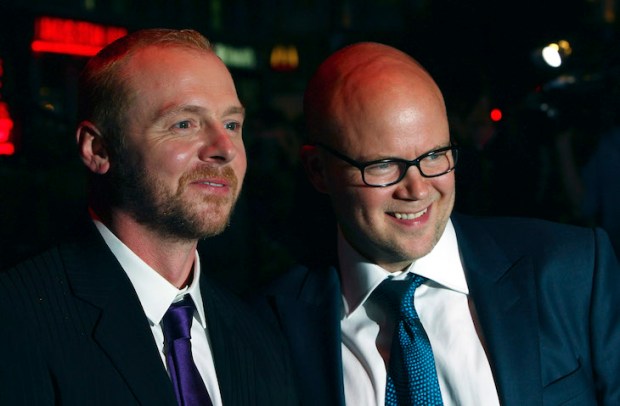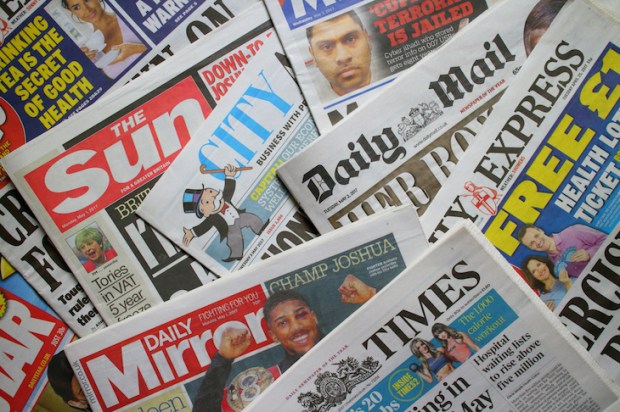A strange ritual takes place on Twitter most evenings at around 10.30 p.m. Hundreds of political anoraks start tweeting the results of the YouGov daily tracker poll due to be published in the following day’s Sun. Some of them are neutrals, but the majority are politically aligned and will only tweet those results that show their party in front.
I often wonder what the point of this is, even though I’m guilty of it myself. It’s not as if anyone is going to see the tweet and say, ‘Ooh, I wasn’t going to vote Conservative, but now that YouGov has them two points ahead I’ve changed my mind.’ I can think of only two sensible reasons for doing this, both quite weak.
The first is it has a mildly demoralising effect on your opponents. Occasionally, I get replies from enraged lefties saying, ‘Well, what do you expect from a Murdoch rag?’ That counts as a successful bit of trolling in my book. The second is it steadies the nerves of the people on your side. For both Labour and the Conservatives, discipline during the election period is essential, and there’s no better backbone-stiffener than a four-point lead, even if it only lasts 24 hours.
But anyone giving these reasons for crowing about good polls is engaging in post-hoc rationalisation. What they’re really doing, I think, is trying to defend their belief that their team is going to win, not just to other people, but also to themselves. Publicising favourable opinion polls isn’t intended to make the result they want more likely. Rather, they’re producing ‘proof’ that the result they’ve already foretold is going to happen.
In other words, it’s a form of confirmation bias, which psychologists describe as the tendency to seize on evidence that supports your point of view, while ignoring or rejecting any evidence that contradicts it. I’m sure this is a feature of all general election campaigns, but it’s particularly apparent in this one with the polls flip-flopping from one day to the next.
As a Conservative supporter, I’ve developed dozens of copper-bottomed arguments for dismissing polls that show our opponents doing well. If Labour has gone up three points and the Conservatives down two, the unwelcome shift is ‘within the margin of error’. If Labour has suddenly surged to a five-point lead, then the poll is an ‘outlier’. Or if the poll shows Ukip doing unexpectedly well, it’s because the respondents were ‘prompted’.
After a bit it becomes difficult to sustain this scepticism — it’s obvious by now that the two main parties are neck-and-neck. But that doesn’t stop me thinking the blues are going to win. At this point, I produce another set of unassailable arguments. For instance, there’s the ‘shy Tory factor’, a term used by psephologists to describe the reluctance of some Conservative voters to identify themselves to pollsters. This explained why the polls understated support for the Tories in the run-up to the 1992 election. Nearly all of them had the Conservatives just a point ahead the day before polling day, yet we romped home with 41.9 per cent of the popular vote, compared with Labour’s 34.4 per cent.
Then there’s the ‘incumbency factor’, whereby the governing party tends to rally during the final days of the campaign. A political sociologist called Stephen Fisher has built a model that includes historical data on how support for challengers often fades as election day approaches. Based on current opinion polls, Fisher is predicting that Labour will win 32 per cent of the vote and the Tories 34 per cent, enough to make them the largest single party.
Finally, there’s the killer argument that no party led by someone with Ed Miliband’s dire approval ratings has won a general election. I know a lot of Tories who are counting on this, myself included. We are convinced — oh yes — that many people who say they’re not going to vote Tory will ‘blink’ when faced with the prospect of Ed Miliband in No. 10. They will be particularly prone to blinking — their eyelids will flutter and they will almost faint with fright — when they realise that Miliband will be reliant on Alex Salmond to get through any legislation.
One of the curiosities of confirmation bias is that being aware of it doesn’t make you any less likely to be guilty of it. Which is why I’m still convinced Cameron is going to win and will continue to tweet the polls that show the Tories in the lead.
Got something to add? Join the discussion and comment below.
Get 10 issues for just $10
Subscribe to The Spectator Australia today for the next 10 magazine issues, plus full online access, for just $10.
Toby Young is associate editor of The Spectator.
You might disagree with half of it, but you’ll enjoy reading all of it. Try your first month for free, then just $2 a week for the remainder of your first year.















Comments
Don't miss out
Join the conversation with other Spectator Australia readers. Subscribe to leave a comment.
SUBSCRIBEAlready a subscriber? Log in